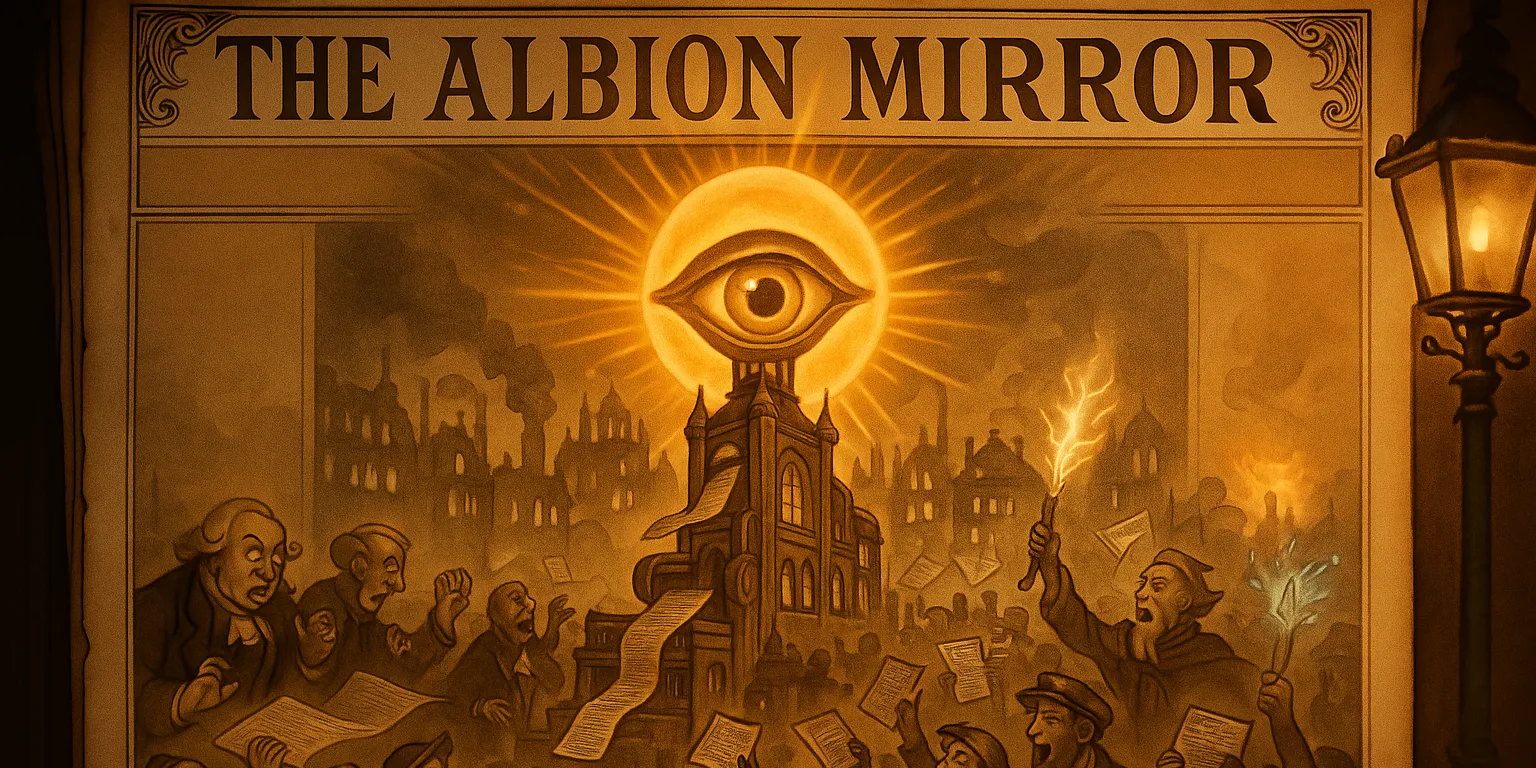The Albion Mirror
Flagship of the Fourth Estate
Information has always been power, and there have always been those who gathered it - then sold it to those who stood to benefit from knowing. The invention of the printing press centuries ago made the dissemination of information vastly easier, securing its place as one of the most influential technologies in history. Yet it is only in the past few decades, with a rapid rise in literacy across the population, that there have been enough readers to sustain the newspaper: a publication designed to share information with the public at large.
This has granted power to those who control the newspapers - they choose what information enters the public eye, and what remains concealed. Through their readership, a newspaper can exert vast influence over individuals and institutions alike, for good or ill. They are found on every street corner, in every city across the Empire - and together, they have amassed enough power to move the world in a direction of their choosing.
The Albion Mirror
Foremost among the publications is The Albion Mirror. Based in the Empire's capital of Lundeinjon, it boasts a wider readership than any other newspaper in the world. Though relatively young compared to the older institutions of the Empire - having been established only in 1788 - it has amassed influence at a remarkable pace in the post-war era. While it still surprises more conservative politicians and members of the nobility that anyone without a comfortable income can read at all, those with their finger on the nation's pulse have noted that the Mirror is fast becoming a superpower within the Empire.
Over its forty-two-year history, the Mirror has earned a reputation for investigating the dark and shadowed corners of the Empire - and bringing those stories to light. Moreover, it has introduced a novel concept to imperial society: the right to know. Before recent decades, there was little sense that the people of the Empire had any claim to knowledge of their leaders' character, conduct, or crimes. The populace was expected to trust in the nobility of nobles and the civility of the gentry. The Mirror, however, has challenged this idea, rejected it outright, and replaced it with an ethos of its own making. It has cast itself as the people's informer - and told the public that they do have the right to know who their leaders truly are.
Brave New World
As the Mirror and other papers expand their influence, their full impact on the world remains difficult to predict. By introducing the masses to the news of the day, they are shaping a new kind of citizen - one who feels a duty and responsibility to stay informed about the world around them. This new citizen is empowered in a way never before seen in history: for a half-penny, they can access the kind of information - and power - that was once the exclusive domain of princes and ministers. And once they possess that power, that knowledge, many feel compelled to act. Where once scandals were whispered, now they shout - and the powerful can feel the reverberations of the new world they have entered.
Let Truth Speak
Those Damned Pictures
While literacy has been on the rise for decades, a significant portion of the population has yet to learn to read. The Mirror, unwilling to leave them out of its readership, has found a compelling solution.
Editorial cartoons now make up a major part of each issue, creating a visual language that transcends the written word. Prominent politicians and nobles are routinely depicted in caricatures more recognizable than their actual likenesses, and the cartoonists have developed a symbolic vocabulary - using animals, objects, and recurring figures to represent key issues and institutions. This has allowed even the least educated of Albion's citizenry to absorb and be influenced by the newspaper's perspective on current events.
This development has enraged many members of Parliament, particularly those who rely on their constituents not knowing - or not understanding - what takes place in the capital. Within the halls of power, the cartoons are bitterly referred to as "those damned pictures." But after a single, half-hearted attempt to ban them nearly sparked a riot, Parliament has largely resigned itself to their continued existence.






Will the Mirror be connected to the radio when it inevitably is produced?
Radio might not be inevitable; they’ve had no progress towards electricity as yet. There’s a reason for that that Lorekeepers will find here:
Kostaránet
The Troglodyte nation
It passed right over my head, not gonna lie, but now I renoticed I'm squeeing so hard. But I did love the quote - its something so viscerally human.